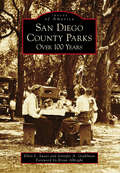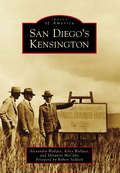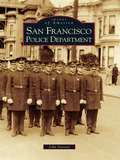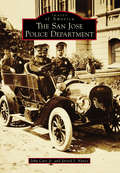- Table View
- List View
San Diego County Parks: Over 100 Years (Images of America)
by Brian Albright Ellen L. Sweet Jennifer A. GrahlmanFrom its earliest park in 1913, the County of San Diego has more than 100 years of serving the public with unique park and recreational experiences while preserving significant natural and cultural resources. Officially, the San Diego County Board of Supervisors established the Department of Recreation in 1946. Today, the department manages over 50,000 acres of parks, campgrounds, trails, recreation centers, sports complexes, and ecological and open-space preserves. The county covers an area that includes coastline, mountains, deserts, lakes, lagoons, and other habitats�it is the nation�s most biologically diverse county�and the department�s properties mirror this biodiversity. They also contain sites that reveal the county�s history: Mexican-era ranchos, an overland stage station, remnants of an early gristmill, Victorian mansions, traces of flume systems, Depression-era construction projects, an 1887 boathouse, and parks that reflect the advent of early automobile tourism.
San Diego Harbor Police (Images of America)
by Michael P. RichThe San Diego Harbor Police Department has proudly provided more than 50 years of law enforcement. From its humble beginnings as a small security force formed after World War II to protect San Diego imports to the modern and sophisticated police force it is today, the San Diego Harbor Police Department serves as a shining example of the exciting and important role law enforcement plays in the development of a busy 21st-century city. Through a stunning collection of never-before-seen photographs, this book tells the story of the officers who have served and protected one of America's most historic and vital harbors. History lovers, police aficionados, and San Diego locals and visitors will be fascinated by the photographs within, which document the department's history from 1934 through its 1962 transition into the San Diego Unified Port District of today.
San Diego Police: Case Files (Images of America)
by Ed Lavalle Steve WillardA Pacific Coast metropolis famous for beautiful beaches and perfect weather and an American municipality since 1850, San Diego is America's eighth-largest city. Known as America's "Finest City," it contains a wealth of history--evolutionary as well as revolutionary--in its crime files. Among those are the founder of the California wine industry, Judge Roy Bean, a black officer before the Emancipation Proclamation, a 19th-century Native American police chief, and women who had the power to arrest before they had the right to vote. Major incidents include massive floods, civil unrest, wildfires, and some of the largest police gun battles in history. San Diego also witnessed mass murder, America's first major school shooting, the worst aviation disaster in American history, and the deadliest streets, per capita, to police. How the San Diego Police Department (SDPD) handled it all became textbook for many other police agencies.
San Diego Trolleys (Images of Rail)
by Douglas W. MengersStarting with the first horse-drawn trolleys introduced by the San Diego Streetcar Company in 1886, San Diego’s history included the growth and decline of several trolley systems. After electricity arrived, San Diego was the site of early experimentation for electric trolleys on the West Coast and home to a short-lived cable car system. In the 1890s, sugar baron John D. Spreckels purchased these failed lines and consolidated them into the San Diego Electric Railway. This railway expanded rapidly, leading to the development of new trolley suburbs at the turn of the century, including North Park, Normal Heights, and Mission Beach. Ridership waned with the Depression and the introduction of autobuses, and though it temporarily rose during the war years, this decline led to the dismantling of the trolley system in April 1949.
San Diego's Kensington (Images of America)
by Margaret Mccann Kiley Wallace Alexandra Wallace Robert SedlockThe mid-city San Diego neighborhood of Kensington was conceived as a streetcar suburb. Composed of several subdivisions, the first was Kensington Park, mapped on April 8, 1910. The principals involved in developing Kensington were also involved in creating the 1915 Panama-California Exposition in Balboa Park, and it was hoped that the throngs attracted to the exhibition would find Kensington to be a perfect place to build a home. The development of Kensington Manor, Kensington Heights, Talmadge Park, and adjacent subdivisions would bring Spanish-style houses, tree-lined streets, and a commercial core. Prominent people such as Judge Joseph Rutherford, Sarah Fitzpatrick Harden, G. Aubrey Davidson, two former Mexican presidents, and numerous politicians made Kensington their home. Ideal location, well-preserved architecture, and the small-town sensibilities of longtime residents combine to make Kensington a unique and desirable place.
San Fabian Supply Co. (Philippines)
by Neil Harrison Claudine B. MaloneMacDowell Corp., a producer of construction supplies, terminated its exclusive distribution arrangement with San Fabian Supply Co., its sole distributor in the Philippines for nearly 20 years. Paul Cheng the owner of San Fabian had to decide whether to accept MacDowell's decision or drop the line altogether. The case raises the notion of "relationships" in channels of distribution. MacDowell and San Fabian both felt that they were better positioned to serve the end-user and increase market penetration.
San Francisco Ballet: On "Pointe" for the Future
by Rohit Deshpande Nicole Tempest KellerAn examination of the strategic challenges facing the SF Ballet in 2019 due to changes in demographics, lifestyles, and the city of San Francisco itself.
San Francisco Bay Consulting
by George P. Baker Karin B. MonslerSan Francisco Bay Consulting leads the field of economic consulting and litigation support in the application of powerful computers and cutting edge software to manipulate and analyze large data sets. The transfer pricing system, used to facilitate the purchasing and payment of computer resources, is falling apart as computer prices drop and consultant demands broaden. Researchers, forbidden to go outside for their hardware or software needs, range from frustrated to furious when they can't get the software they want or when transfer prices yield charges to clients that are greater than their computer's current market price. The case presents the company as it evaluates the system and discusses possible changes in pricing and sourcing policies.
San Francisco Beer: A History of Brewing by the Bay (American Palate)
by Bill Yenne Shaun O'SullivanThe story of beer in San Francisco is as old as the city itself. San Francisco had its first commercial brewery by 1847, two years before the gold rush, and went on to reign as the major brewing center in the American West through the nineteenth century. From the 1930s to the early 1950s, iconic San Francisco-based breweries Lucky and Acme owned the statewide California market. In the 1960s, Fritz Maytag transformed San Francisco's tiny and primitive Anchor Brewing into America's first craft brewery. Now, well into its fourth generation of craft breweries, San Francisco has seen more new breweries open in the second decade of the twenty-first century than were opened in the entire previous century, proving that tech is not San Francisco's only booming industry. Join local author and beer enthusiast Bill Yenne as he explores San Francisco's rich tapestry of beers and breweries that have made it a brewing capital in the West.
San Francisco Police Department (Images of America)
by John GarveyThe officers of the San Francisco Police Department would be the first to tell you that police work in this city is nothing like Dirty Harry, The Streets of San Francisco, or Nash Bridges. It's a gritty reality, occasionally infused with glamour, but always characterized by the innovation and unusual proceedings found as a matter of course in this unique city. The department was established in 1849, when the population surge from the Gold Rush created a desperate need for law enforcement. An initial 35-member force was formed to protect over 20,000 residents. Since then, the SFPD has presided over notorious events, including the case of the Zodiac Killer, Zebra Murders, the Patty Hearst Hibernia Bank robbery, the 1975 assassination attempt on President Gerald Ford, and the Golden Dragon Restaurant and 101 California Street Massacres. While the SFPD story includes a gruesome and sometimes scandalous past, its dedicated officers continue to provide a positive and invaluable service to the diverse metropolitan community of San Francisco.
San Francisco, 2015 #tech #inequality
by Allison M. Ciechanover Clayton Rose Kunal ModiIn December 2013 a group of angry protesters blocked one of the commuter bus provided by the large Silicon Valley firms (known as "Google buses") which was stopped in San Francisco on its way to the company's headquarters 40 miles south. The protests were a tangible manifestation of the sharp increase in tensions between citizens upset with changes they saw in San Francisco and the "techies" and technology companies they held responsible for the disappearing middle class, increased homelessness, languishing public education, and a sense of departure from the unique culture and values of the city's past. This case explores some of the substantial economic inequality problems facing San Francisco, and how much responsibility for creating or exacerbating the problems rests with the government, technology firms, their employees, and the nature of capitalism, among others. It also allows for discussion of what technology firms and the "techies" might do to help alleviate the problem.
San Jose Police Department, The (Images of America)
by Jarrod J. Nunes John Carr Jr.Originally known as San Jose de Guadalupe, San Jose was ruled by Mexico until 1848, when, after the Mexican-American War, California joined the United States of America. In 1849, the newly elected government appointed a chief of police, and the San Jose Police Department was born. Its mission has been to respond to the distinctive needs of the community from the early agricultural age to today's high technology age. The San Jose Police Department has been a leader in law enforcement technology and training and is considered a model for modern police departments. Today, with a thousand sworn officers and 200 support personnel, the San Jose Police Department serves over a million citizens in the city and polices an area of over 180 square miles. The wonderful photographs compiled over the department's history illustrate the efforts of the hundreds of men and women who built the San Jose Police Department into one of the premier law enforcement agencies in the United States.
San Marino and International Investments
by Lorenzo RiccardiThis book seeks to promote investment opportunities in a global context, given San Marino’s advantageous tax and corporate system. After introducing readers to the country’s historical, geographical and political background, it focuses on current economic trends, business practices and the main institutions for economic development. In turn, the book illustrates San Marino’s unique international status, which supports its active membership in numerous international organizations. Additionally, it reports on the country’s ties with the world’s largest economies. These ties are chiefly characterized by international treaties and Double Tax Agreements (DTAs), which are also analyzed. In closing, the book shares insights into other small European countries’ dealings with San Marino (Andorra, Lichtenstein and Monaco).
San Miguel de Allende: Mexicans, Foreigners, and the Making of a World Heritage Site (The Mexican Experience)
by Lisa Pinley CovertStruggling to free itself from a century of economic decline and stagnation, the town of San Miguel de Allende, nestled in the hills of central Mexico, discovered that its “timeless” quality could provide a way forward. While other Mexican towns pursued policies of industrialization, San Miguel—on the economic, political, and cultural margins of revolutionary Mexico—worked to demonstrate that it preserved an authentic quality, earning designation as a “typical Mexican town” by the Guanajuato state legislature in 1939. With the town’s historic status guaranteed, a coalition of local elites and transnational figures turned to an international solution—tourism—to revive San Miguel’s economy and to reinforce its Mexican identity. Lisa Pinley Covert examines how this once small, quiet town became a UNESCO World Heritage Site and home to one of Mexico’s largest foreign-born populations. By exploring the intersections of economic development and national identity formation in San Miguel, she reveals how towns and cities in Mexico grappled with change over the course of the twentieth century. Covert similarly identifies the historical context shaping the promise and perils of a shift from an agricultural to a service-based economy. In the process, she demonstrates how San Miguel could be both typically Mexican and palpably foreign and how the histories behind each process were inextricably intertwined.
Sanac Logistics: Time Equations to Capture Complexities in Logistics Performance
by Robert S. Kaplan Steven R. AndersonThis chapter shows the application of Time-Driven Activity-Based Costing in a complex distribution company, Sanac Logistics, as it made a strategic transition from a sales-driven company to a profit-driven one.
Sanctuary Soft: International Expansion Strategies
by Boris Groysberg Tim Marshall Geoff Marietta Adam HartleyA U.S.-based security software company considers its options to expand. Different labor-market and labor-law situations are analyzed for the U.S., U.K., Germany, China, and India.
Sander/Müller, Meine Zahnarztpraxis – Ökonomie
by Thomas Sander Michal-Constanze MüllerDas einzige Buch zum Thema speziell für Zahnmediziner zeigt, wie niedergelassene Zahnärzte Kosten und Steuern sparen können - in der Praxis und im Privatbereich. Die Autoren stellen die Möglichkeiten einer strategischen Finanz-, Liquiditäts- und Investitionsplanung vor. Als Teil eines optimierten Gesamtkonzepts lassen sich mithilfe dieser Instrumente das Praxismanagement und die Wettbewerbsposition wesentlich verbessern.
Sanders Confectionery (Images of America)
by Greg TaskerFor more than 130 years, there has been no sweeter word in Detroit than Sanders. The venerable confectioner was once as much a part of Detroit's streetscape as the Big Three, Hudson's, and Coney Islands. Sanders was more than just an ice-cream and candy shop. A Detroit icon, it served a fountain of memories for generations. Detroiters stood two and three deep behind lunch counters for tuna or egg salad sandwiches, devil's food buttercream "bumpy"cake, hot fudge sundaes, and Sanders' signature dessert--hot fudge cream puffs. As Detroit boomed, so did Sanders. At its peak, the company boasted more than 50 stores, with its products available in as many as 200 supermarkets. The Sanders story began in Chicago, where Fred Sanders opened his first shop. A series of misfortunes prompted him to relocate to Detroit, where he began selling his confections on Woodward Avenue. Business grew steadily, and by the early 1900s, he had opened other shops along Woodward and elsewhere in Detroit. The Motor City nearly lost Sanders in the mid-1980s, but its desserts shops have begun resurfacing, thanks to another Detroit institution, Morley Brands LLC, which bought the Sanders brand.
Sandlands Vineyards
by Benjamin C. Esty Greg SaldutteApproximately 80% of the wineries in the US breakeven or lose money. An even greater percentage lose money on an economic basis (i.e., after a charge for the cost of equity). Tegan Passalacqua is a successful, young, Californian winemaker who specializes in making "old vine" wine (i.e., wine from vines that are at least 60 and up to 100+ years old). By day, he is the head winemaker at Turley Wine Cellars, a leading Zinfandel producer. In his spare time, however, he runs his own winery called Sandlands which premium wines using historic, out-of-favor grape varieties such as Carignane, Mataro, and Chenin Blanc. Despite the odds, Sandlands appears to be succeeding. The question is why and whether his performance is sustainable. The case is set in December 2017, as Passalacqua was deciding whether to buy a building and develop a winery at a cost of up to $500,000. Because he already owns an old vine vineyard, and has limited resources, he must decide if this is the right investment to make next.
Sandra Brown Goes Digital (A): The Promise and Perils of Social Movements in a Healthcare Company
by Rosabeth Moss Kanter Jonathan CohenCase
Sandra Brown Goes Digital (B): The Commitment Decision
by Rosabeth Moss Kanter Jonathan CohenSupplement
Sandra Brown Goes Digital (C): Raising Quality in a Healthcare Company
by Rosabeth Moss Kanter Jonathan CohenSupplement
Sandwiches Without Bread: 100 Low-Carb, Gluten-Free Options!
by Daria PolukarovaLet these enticing photos and simple instructions persuade you to better your daily eating habits. Healthy, filling, and delicious, they are budget-friendly and adjustable to any diet. Whether you follow a Paleo, non-gluten, low-carbohydrate, or just an all-around healthy lifestyle, Sandwiches Without Bread is for you. Featuring one hundred creative recipes along with mouthwatering photographs, this book will appeal to both your appetite and your waistline. Instead of bread, sandwiches can be made as lettuce wraps, between scooped cucumber, apple slices, grilled eggplant or pineapple, and dozens of other substitutes?the options are endless. Recipes include: Smoked tofu banh mi Crispy one-bite cracker sandwiches Easy nori sandwich with butterfish Crab cucumber roll-ups Zucchini panini Pesto chicken halloumi sandwich Lentil pancake sandwich with herbed mushrooms Cauliflower breakfast cups So many more!
Sanford C. Bernstein Goes to Asia
by Linda A. Hill Dana M. Teppert Allison J. WigenSanford C. Bernstein, a premier sell-side research firm, is expanding globally. Three years after launching Bernstein's Asian business, senior management has appointed Ghislain de Charentenay, a six-year sales veteran of the firm, as director of Asian research in Hong Kong. He is the first director of research Bernstein has put on the ground in Asia. As the firm faces the challenging realities of scaling its Asian business and meeting growing client demand for global products, de Charentenay must figure out how best to support the senior research analysts in leveraging their franchises. And with a recent wave of attrition among Bernstein's research associate ranks in Hong Kong, de Charentenay and the management team must also consider where to focus their recruiting efforts.
Sanford C. Bernstein Goes to Asia (B)
by Linda A. Hill Allison J. WigenThis case supplements "Sanford C. Bernstein Goes to Asia." Updates readers on Ghislain de Charentenay's first full year as director of Asian Research at Sanford C. Bernstein in Hong Kong and actions taken by the firm in FY2013.













